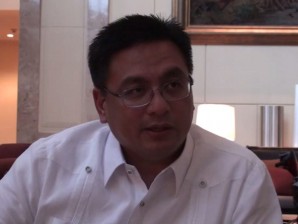MANILA, Philippines – Citing the Bureau of Customs’ record drug haul of over P465.8 million last year, BOC Commissioner Ruffy Biazon has vowed to intensify further the agency’s campaign against narcotics smuggling by disrupting the supply chain of local drug syndicates, as well as the close monitoring of airport passengers for possible attempts to smuggle drugs into the country.
In a text message to the Philippine Daily Inquirer, Biazon said on Thursday that the BOC Task Force on Dangerous Drugs and Controlled Chemicals is “determined to do better than last year in order to make it more difficult and more costly for drug syndicates to conduct their illegal trade.”
The Department of Finance-attached agency will do its best to “disrupt the drug syndicates’ supply chain,” he disclosed.
“We will also work closely with other law enforcement agencies, such as the Philippine Drug Enforcement Agency, in catching local counterparts of international drug syndicates,” said Biazon.
According to the BOC head, “we are encouraged by our record drug-related apprehensions last year.”
“This is due mainly to the increased capability and skill of Customs personnel in detecting drug mules,” he noted.
During last week’s “Kapihan sa Aduana” media forum, held at the BOC headquarters in Manila, Major Rizalina Parong, task force executive director for operations, reported that in 2012, Customs operatives “confiscated 53.5 kilos of methamphetamine hydrochloride, or shabu; 8.73 kilos of high-grade cocaine; 33.9 kilos of marijuana; 19 methylenedioxy methamphetamine tablets; 19 Alprazolam tablets; and six kilos of Piperonal,” among others.
The banned drugs, seized from at least 17 suspected drug mules at the Ninoy Aquino International Airport, were worth P465,897,591.59.
Parong cited the “enhanced monitoring of airport arrivals, especially those coming from high-risk countries for illegal drugs, in compliance with Commissioner Biazon’s order to spare no one in the bureau’s campaign against illegal drugs.”
“There is now a shift in the modus operandi of drug syndicates – from the local manufacture of illegal drugs to the importation of the same banned items – due to the tightened anti-drug smuggling drive of the BOC at the country’s major ports,” she said.
Parong explained that “since laboratory equipment and chemicals used in the manufacture of illegal drugs can no longer pass through customs ports, drug syndicates have resorted to using drug mules in their operations.”
Another indication that law enforcement agencies are winning the war against drug syndicates is the “continued increase in drug prices,” observed Parong.
“From P8,000 per gram two years ago, shabu is sold at P11,000 to P12,000 per gram these days,” she said.
Earlier in a statement, Biazon said the BOC would “never allow any international drug trafficking syndicate from making the Philippines a transhipment point for illegal drugs, much more make the country one of their markets.”
Customs personnel “will at all times be on the watch for illegal drug smuggling attempts…We will not hesitate to prosecute all those involved in the illegal drug trade,” he also said.
For his part, BOC Deputy Commissioner Peter Manzano, also head of the bureau’s Run After the Smugglers program, said they would closely monitor the criminal cases filed by the agency against suspected drug mules, including Roendo Ariata.
On Jan. 8, Ariata was caught by alert Customs personnel at Naia Terminal 2 with 7 kilos of high-grade shabu concealed in several boxes of powdered milk stuffed in his luggage.
He was a passenger on Philippine Airlines flight no. 307 from Hong Kong.
The drug haul was worth at least P56 million, according to the Bureau of Customs.
